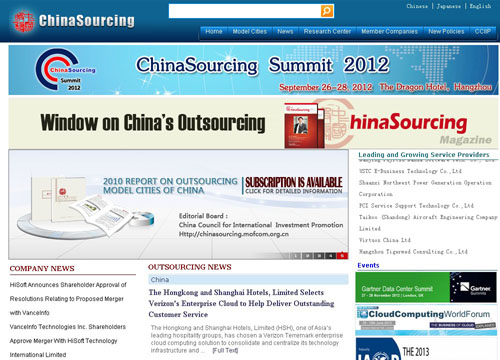Outsourcing's trials and tribulations
Updated: 2012-11-12 09:27
By Wei Tian (China Daily)
|
|||||||||||
Opportunities
|
 |
|
The website of Chinasourcing.org.cn run by the Ministry of Commerce and the China Council for International Investment Promotion. The website shows the government's support for the country's outsourcing businesses, which saw a boom in both their revenues and the number of employees. The more people the companies employed, the more revenues they earned. However, their production costs increased at the same time. [Photo/China Daily] |
The total assets of China's banking system expanded 478 percent in the last decade to 113 trillion yuan. It contributed to one-third of the total profits in the global banking sector, said Jin Shihe, deputy director of the China Outsourcing Institute.
However, he said, the current financial outsourcing market in China is only 15 billion yuan a year, which accounts for a mere 0.2 percent of the $1.2 trillion global financial outsourcing market.
The expenditure on outsourcing remains low among Chinese banks. In 2008, outsourcing only cost 0.5 percent of the spending for Chinese financial institutions, whereas in the US the proportion was 7.4 percent and still growing.
Although the potential remains huge, it is not easy for vendors to cash in on the opportunities because big banks need to be convinced about outsourcing their core data processing out of safety concerns and also because they do not need to cut costs.
"The big financial institutions are investing more and more in IT development. They still have an adequate profit margin to build their own teams to avoid the potential risks in outsourcing," said Chen Hao, a senior IT officer with Bank of China.
There may be bigger opportunities with smaller banks, such as the increasing number of village banks that emerged after recent financial reform.
"As a bank still in its early growth stage, we like to have all of our business processes outsourced," said Song Guangcai, chairman of Jiangdu Jiyin Village Bank, which has only been established for 20 months and has a relatively small 800 million yuan in assets.
"For example, labor costs could account for 21 percent of our total costs but the cost for outsourcing will never be higher than that level," he said.
Nevertheless, change may be afoot. "Reform toward a market-oriented interest rate have highlighted the importance for the banks to lower their costs, which offers greater opportunities for outsourcing companies," said Qian.
Qian's view was echoed by Li Rongcan, vice-minister of Commerce, who argued that outsourcing can create a win-win situation between banks and vendors.
"The Chinese economy has reached a vital stage in its transformation. It is inevitable the financial sector, as the pillar industry, will make structural changes," Li said when delivering a speech at the fourth China Banking, Financial Services and Insurance Outsourcing Summit held in Kunshang, Jiangsu province.
While urging banks to focus on their core business, Li also said outsourcing could help extend the value chain.
"New service models have appeared with the development of technologies such as cloud computing and the Internet of Things, which banks are not familiar with. Outsourcing companies could play a complementary role and guide the innovation of the industry," he said.
Zheng Yangpeng contributed to this story.
weitian@chinadaily.com.cn
Related Stories
Outsourcing to gain boost from domestic demand 2012-11-01 14:11
Outsourcing from cradle to grave 2012-10-29 15:30
Service outsourcing industry thrives in Xiamen 2012-10-12 10:02
Economic downturn benefits China's service outsourcing 2012-09-25 20:24
Govt to support services outsourcing firms 2012-09-26 20:32
Today's Top News
President Xi confident in recovery from quake
H7N9 update: 104 cases, 21 deaths
Telecom workers restore links
Coal mine blast kills 18 in Jilin
Intl scholarship puts China on the map
More bird flu patients discharged
Gold loses sheen, but still a safe bet
US 'turns blind eye to human rights'
Hot Topics
Lunar probe , China growth forecasts, Emission rules get tougher, China seen through 'colored lens', International board,
Editor's Picks

|

|

|

|

|

|





